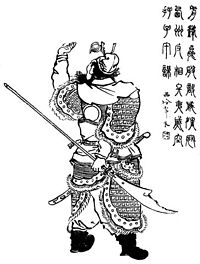Wei Yan
| Wei Yan | |
|---|---|

A Qing dynasty illustration of Wei Yan
|
|
| General of Shu Han | |
| Born | (Unknown) |
| Died | 234 |
| Names | |
| Traditional Chinese | 魏延 |
| Simplified Chinese | 魏延 |
| Pinyin | Wèi Yán |
| Wade–Giles | Wei Yen |
| Courtesy name | Wenchang (simplified Chinese: 文长; traditional Chinese: 文長; pinyin: Wéncháng; Wade–Giles: Wen-ch'ang) |
Wei Yan (died 234),courtesy name Wenchang, was a military general of the state of Shu Han during the Three Kingdoms period. Originally a foot soldier under the warlord Liu Bei (the founding emperor of Shu), Wei Yan rose through the ranks and became a general when Liu Bei invaded Yi Province (益州; covering present-day Sichuan and Chongqing) in 211. His talent and performance during battles helped him to become a prominent figure in the Shu military in a short period of time. He was later appointed as the Administrator of Hanzhong Commandery and as an Area Commander in 219. Between 228 and 234, he participated actively in the Northern Expeditions led by the Shu chancellor Zhuge Liang against Shu's rival state, Cao Wei. After Zhuge Liang's death in 234, Wei Yan was killed by another Shu general, Ma Dai, for alleged treason.
Wei Yan was from Yiyang Commandery (義陽郡; around present-day Tongbai County, Nanyang, Henan) in Jing Province. As one of Liu Bei's personal retainers, he followed Liu Bei into Yi Province (covering present-day Sichuan and Chongqing) in 212 to attack the warlord Liu Zhang. He had many military accomplishments and was assigned as a General of the Standard (牙門將軍). When Liu Bei became "King of Hanzhong" in 219 after his victory over his rival Cao Cao in the Hanzhong Campaign, he selected Wei Yan as the general who would guard Hanzhong and then honoured him with the title "General Who Suppresses the North" (鎮北將軍). This was despite Zhang Fei being considered by the majority and himself to be the likely candidate for the position, which assumed the imminent military responsibility to resist invasion from Cao Cao. When Wei Yan was nominated by Liu Bei, the court was shocked. Liu Bei then asked Wei Yan in front of the mass how would he serve his new post, wherein Wei confidently replied, "If Cao Cao mustered all his forces and invaded, let me assist my lord to repel the enemies; if an Assistant-General came with 100,000 troops, let me engulf them for my lord." During his tenure, Wei Yan borrowed the concept of "double gates" from the ancient text Zhou Yi (周易) and laid numerous camps along the outskirt and trail exits linking to Hanzhong. His defence mechanism was very effective in driving the enemy out, and his arrangement would be adopted by those who later succeeded his post.
...
Wikipedia
